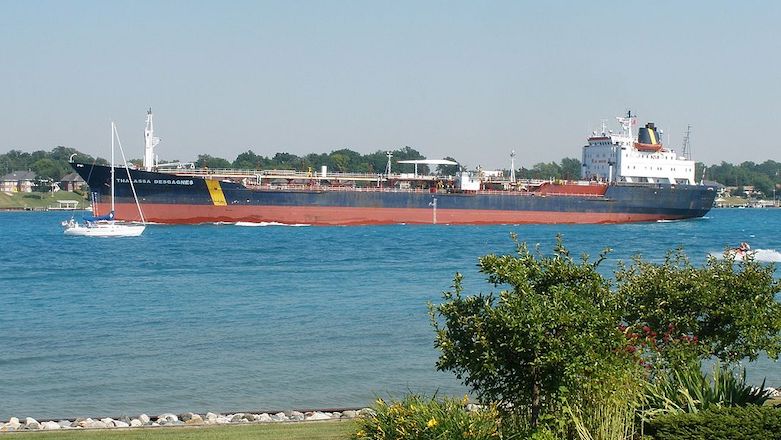Tanker crew thwarted attempted Iranian hijacking: assault on Asphalt Princess explained

WASHINGTON, DC (Kurdistan 24) – The unusual circumstances surrounding what was reported to be, on Tuesday, Iran’s hijacking of a Panamanian-flagged tanker—the Asphalt Princess—were explained by the Times of London two days later, on Thursday.
Read More: Iran reportedly attacks second ship near Gulf of Oman
Although the attack on the Asphalt Princess was reported to be resolved already on Wednesday, no details were provided. That raised a question as to whether the ship had been hijacked at all.
But the ship was, indeed, hijacked, as the Times explained on Thursday. Moreover, Iranian forces were involved.
The crew of the Asphalt Princess succeeded in foiling the takeover. They incapacitated the ship and prevented it from sailing, which allowed US and Omani naval vessels to approach. That, in turn, caused the Iranians to flee the captured ship.
“Iranian navy commandos stormed a tanker in the Arabian Sea,” the Times reported, “and tried to divert it to Iran, but were thwarted after the crew disabled the ship’s engines.”
Citing “a source who was privy to official intelligence briefings,” the Times reported that “armed Iranians stormed the vessel and tried to take it back to Iran, but the crew scuppered the engines.”
“Then,” the source continued, “US and Omani warships turned up and the Iranians got into some boats and went off.”
The attempted hijacking came five days after a lethal Iranian attack on an Israeli-managed oil tanker, the Mercer Street, which killed the tanker’s Romanian captain and a British security guard.
Read More: US, UK join Israel in charging Iran with attacking oil tanker
Although the US quickly concluded that Iran was behind the assault on the Mercer Street (apparently on the basis of information provided by Israel), it has yet to reach any conclusion about the Asphalt Princess—or, at least, to say so publicly.
The Biden administration gives the impression that it is so keen to revive the 2015 nuclear deal, formally known as the Joint Comprehensive Plan of Action (JCPOA), that it is prepared to turn a blind eye to significant manifestations of Iranian aggression.
Asked on Tuesday about the hijacking of the Asphalt Princess, US State Department Spokesperson Ned Price replied: “We are aware of the reports of a maritime incident in the Gulf of Oman. We are concerned; we are looking into it; we are coordinating with partners, but at this point I just don’t have anything more for you on it.”
On Wednesday, asked again about the ship, Price replied, “We can confirm that personnel have left the Panama-flagged Asphalt Princess, this commercial vessel that was seized yesterday.”
“We believe that these personnel were Iranian, but we’re not in a position to confirm this at this time,” he said.
The Mercer Street is a Liberian-flagged vessel, and the US is working with the United Kingdom, Israel, Romania, and Liberia on a coordinated response to the attack on the ship.
The UK has the lead in this effort, and it was reported on Thursday that they will will present the issue to the Security Council in a closed-door session on Friday.
Ebrahim Raisi: Iran’s New Hard-Line President—but No Change in US Position
On Thursday, Ebrahim Raisi, a hard-line cleric and protege of Supreme Leader Ali Khamenei, was sworn in as Iran’s new president. The Wall Street Journal characterized his first speech as president as, at times, conciliatory, and at other times, defiant.
Raisi emphasized the importance of restoring Iran’s ability to trade freely with other countries. “We will support any diplomatic plan that would realize this goal,” he said.
But Raisi also affirmed, “The policy of pressure and sanctions will not make the Iranian nation refrain from pursuing its legitimate rights, including the right of development.
Asked on Thursday about the US view of Raisi and prospects for resuming the indirect talks in Vienna on reviving the JCPOA, Price repeated the long-established position of the Biden administration.
“Our message to President Raisi is the same as our message to his predecessors,” Price said. “We are waiting to see,” he continued, “the approach that the new government in Iran will take, and we will in turn respond in consultation with our partners.”
“For our part, we’ve made very clear that we are prepared to return to Vienna to resume negotiations,” Price continued.
That is the core of the US position: Washington is ready to return to the indirect nuclear talks.
Although Price warned that US patience was not unlimited, he offered no deadline by which Iran needed to agree to resuming those talks.
On Wednesday, Israel’s Defense Minister, Benny Gantz, warned the UN Security Council that under present conditions Iran could produce the fissile material for a bomb within 10 weeks.
